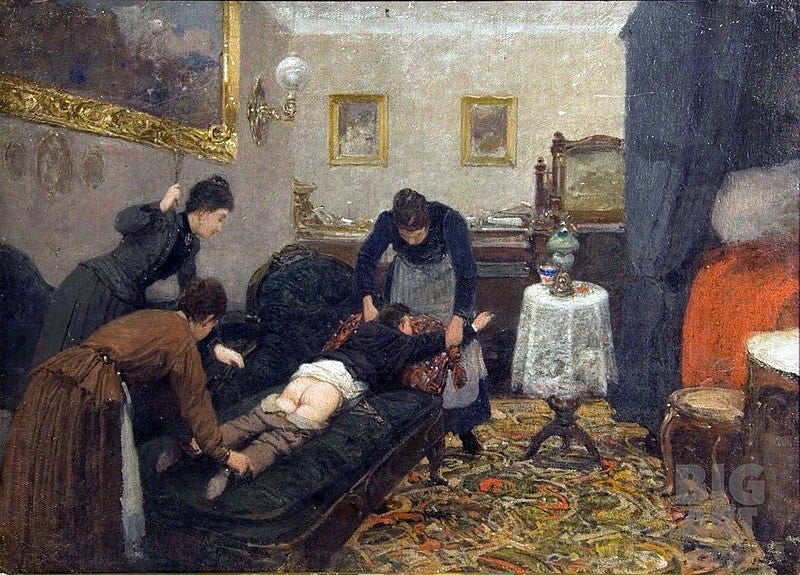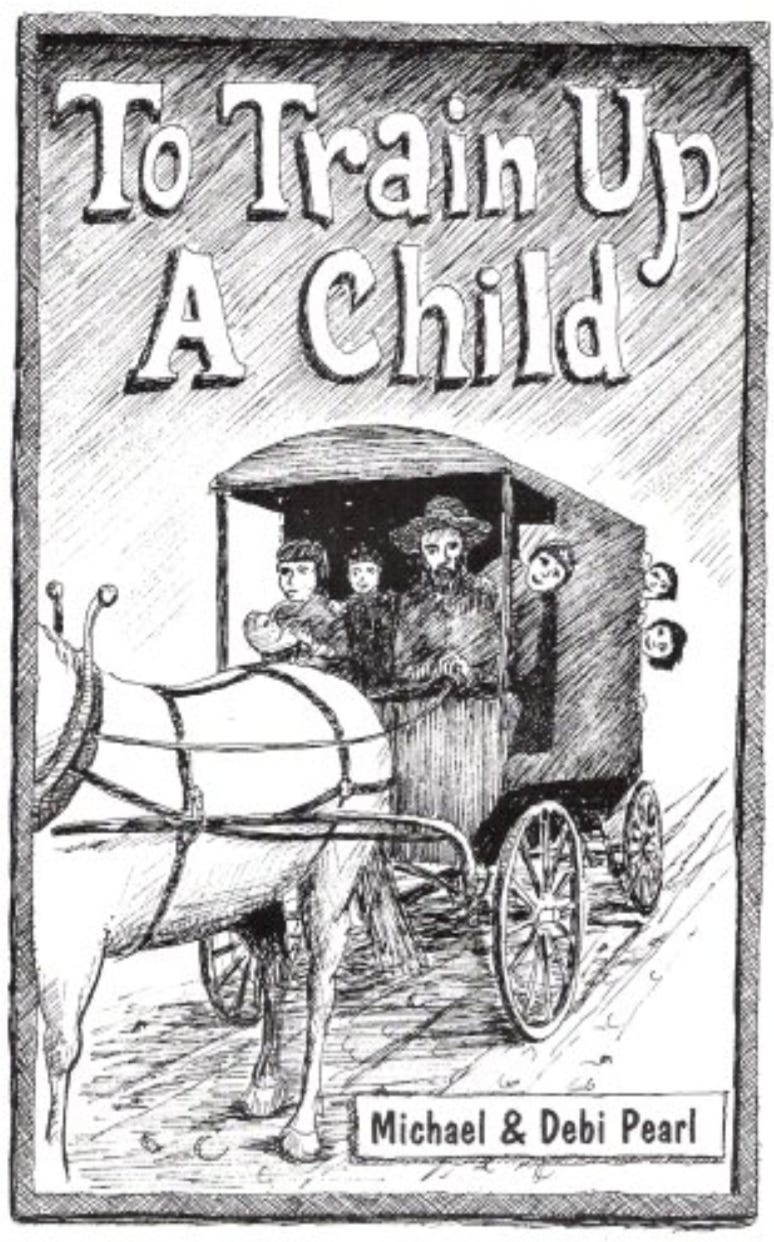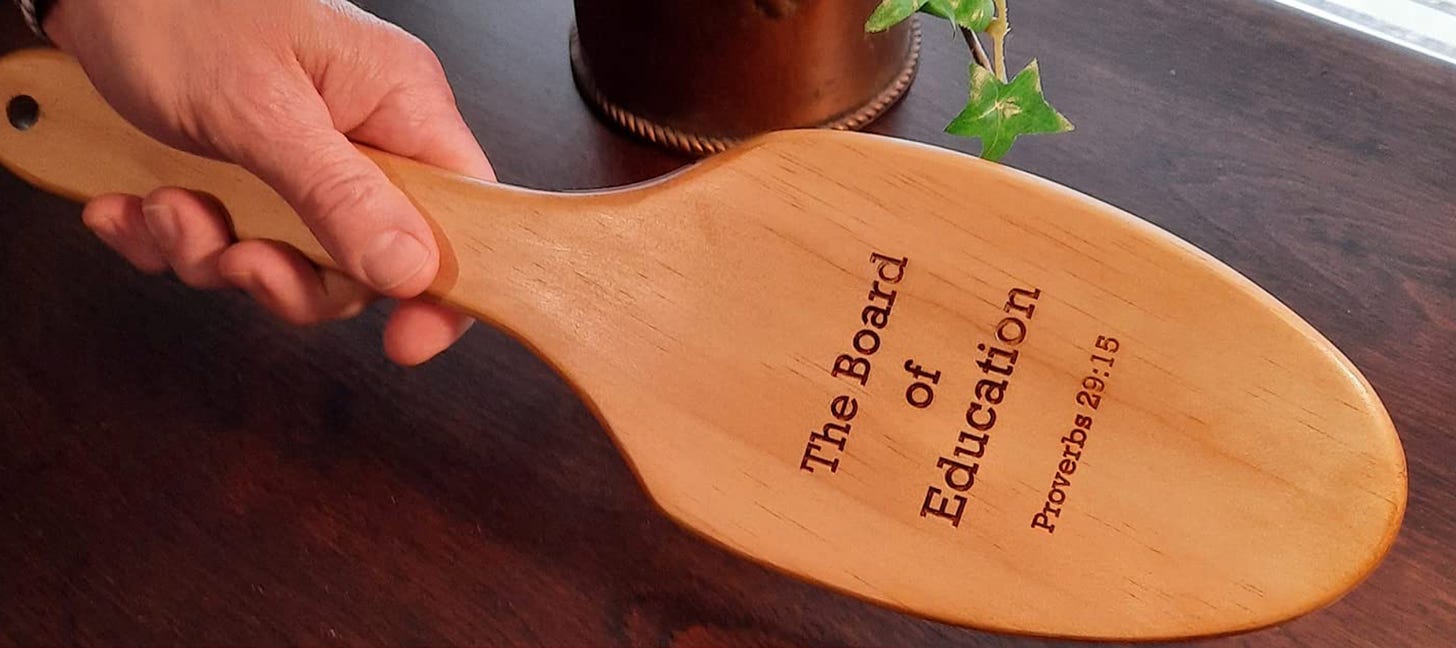Ministry of Violence
“Pain is a marvelous purifier”: Corporal punishment, Evangelicals, and the Doctrine of Obedience
This is the first of a three-part series devoted to corporal punishment in evangelical Christian households. Today’s piece focuses on views of corporal punishment in evangelical culture, its historical background, the doctrine of demanding absolute obedience from children, and its effects. Part 2 is about the effects of childhood corporal punishment on romantic relationships, and Part 3 will discuss breaking the cycle of abuse in parenting. The content of this series may be disturbing to many, as it will contain graphic descriptions of child abuse and its consequences.
A note on sources: Due to the delicate nature of these subjects, most of my correspondents asked to remain pseudonymous. Pseudonyms will be indicated by use of a first name; full names, unless otherwise indicated, are real.

In some hands, a wooden spoon is an innocuous object, a kitchen tool for stirring and scooping. In others, it is a weapon. “My mom wasn’t averse to carrying around a wooden spoon to hit us with,” Liz van Noggeren, 46, told me. “She broke that wooden spoon on me more than once.”
If you strike a child enough times and with enough force with a wooden spoon, it will shatter. Many of the people who wrote to me about their childhoods had spoon after spoon broken on their thighs and backs. At 23, Riley refuses to have one in her house. “I don't even keep them in my kitchen for cooking purposes,” she said. “They're not allowed in my house at all.”
Wooden spoons are insulated and relatively nonreactive and are excellent implements for stirring even the hottest and sourest of things. They are also instruments of pain that linger in the memory far longer than any taste could linger on the tongue.
I started researching evangelical Christian corporal punishment quite recently, though I had known for years it was and remains a common practice in millions of American households. Knee-deep into parenting guides that read, to me, like alien and sadistic torture manuals, I realized I wanted—and needed—to supplement my reading with the voices of people who had lived with the tactics laid out on paper. So I put out a simple Tweet, asking people who had had such childhoods to reach out to me for a research project.
The response was immediate, and wide-ranging, and intense. Within 48 hours, one hundred people had reached out to me, sharing pieces of their stories on email and DM. Within 72 hours, fifty more had reached out. I wound up designing a 12-question survey—What was your experience of corporal punishment like? What parenting books or doctrines do you recall your parents using? Do you feel childhood corporal punishment has affected you as an adult?—and the responses contained so much candid anguish I marveled the words didn’t etch holes in my screen.
I do not have children, and the people sending their stories to me were for the most part talking to a stranger, a childless Jew, no less. I have only ever used a wooden spoon for stirring soup, or scooping up fried onions. Their experiences were harrowing; it’s an axiom in journalism that people experiencing bliss and contentment are unlikely to reach out to us, a profession that deals in power and in pain, unless they are trying to sell something. The people who reached out to me had nothing to sell; all they wanted was to prevent anyone else from going through what they had experienced when they were too small to defend themselves.
Respondents ranged from 22 to 65; many were my age, in their early thirties. Above all, they were grateful someone was paying attention. Someone wanted to talk about what had happened to them. People who have left evangelical denominations have their own thriving and pained and joyous communities online—in Facebook groups, on blogs like Patheos and Recovering Grace, and podcasts like Kitchen Table Cult and Exvangelical. But many expressed to me that the feeling of an outsider examining what they had been through, and finding it horrifying, was in and of itself validating: the act of observation, the act of listening, was almost enough, in and of itself. So I set out to tell this story—their stories: a story about the American evangelical culture that gave rise to a doctrine of systematized child abuse; about how it developed and why; about the theology that says to refrain from beating your children is to declare yourself better than God, and exposes them to the risk of eternal damnation.
Hitting Children
As it is with so many things—capital punishment, guns, health insurance—the United States is an outlier in the developed world when it comes to hitting children. (Use any synonym you like: spank, swat, pop, discipline, chastise—what you’re talking about is striking a child with the intent to cause pain.) Corporal punishment of children is outlawed completely in 63 countries; in the U.S., it is legal in all fifty states. With paddles, fists and palms, with spoons and switches, it is permissible—and in many social contexts encouraged—to punish children physically for any misbehavior. Hitting children has the support of the Supreme Court. In nineteen states, hitting children is permitted in public schools.
Among the general populace in the United States, support for hitting children is quite high—37%—though it has lessened in recent decades: the overwhelming scientific consensus is that physical punishment offers no benefits to children whatsoever and puts them at significant risk of both mental and physical health issues throughout their lives. But there remains a broad and widening gap between evangelicals’ perceptions of spanking and those of the general public. Roughly half of evangelicals support spanking, and those who do seem to believe in it fervently. According to Pew Research, evangelicals make up 25% of the American population. Half of that is forty-one million people.
Evangelicals are an enormously influential bloc, both culturally and politically, and have spent the past half-century mobilizing. But too often coverage of of the group is an odd mix of undue deference—uncritically reproducing the propagandistic notion that fundamentalist communities are the pinnacle of “family values”; conflating white evangelicalism in particular with a kind of “real” Americana—and dripping, aw-shucks condescension that views the ideas and experiences of evangelicals as fundamentally ignorant and unserious. Vanishingly few national reporters come from evangelical backgrounds. The truth is that evangelicals are not monolithic on the subject of hitting children. But just beneath the surface of too many evangelical childhoods is an ocean of pain.
Corporal punishment of children is, of course, not new. It is—as many evangelical theologians and parenting experts would have you know—as old as the Bible itself. Children are small and unruly beings who toddle and scream and love you with every cell, and need you for all things until they don’t anymore. And for all of time, some parents have used the flats of their hands or the nearest object to quell sleeplessness or squalling. It is probable that most readers will have undergone some form of corporal punishment at one point or another in their childhoods, whether in a spirit of judicious discipline, or in a moment of untrammeled parental anger. It is unlikely, however, that they will have undergone such treatment daily, let alone for the sake of God, in the full belief that should the rod be spared, the child risks being consigned, forever, to hell. That is the reality for many evangelical Christian children, pinned under an unsparing theology that has developed in bestselling books, charismatic ministries, and home-schooling curricula over the past fifty years.
The Sword and the Sandwich is a newsletter about serious extremism and equally serious sandwiches. Please consider supporting this work with a paid subscription:
The Political Roots of Child Subjection
In 1970, an obscure child psychologist named James Dobson published a book that would come to spearhead a movement toward biblical parenting. He positioned it as a necessary curative for the permissive, sinful culture that swept through America in the sixties. The book proclaimed its “countercultural” status in the title: Dare to Discipline. Dobson’s vision was undergirded by repulsion at widespread social chaos, and at its core was his solution: the enforced submission of children to absolute authority.
The emergence of evangelicals as an active right-wing political force on the American scene came into full force over the subsequent decade, largely as a backlash to the civil-rights movement and school integration. In tandem, and in ways that are complexly intertwined with an overweening political agenda, a new vision of the domestic sphere arose in popular books, ministries and churches. Raising the specter of student-led activism—the antiwar, civil rights and feminist movements—a new generation of evangelical leaders portrayed strict discipline in the home as a solution to social disorder.
“In the last half-century, Conservative evangelicals were coalescing as this partisan political movement and coalescing around a particular cultural orientation, and childrearing is right at the center of that,” Kristin Kobes du Mez, historian and author of Jesus and John Wayne: How White Evangelicals Corrupted a Faith and Fractured a Nation, told me. “Out-of-control children were unravelling the social fabric of the country. So it was absolutely critical for parents to get their kids in line. It started in the home: you discipline your kids, and then your kids will grow up to be functioning members of this social order, which was always understood in a hierarchical sense. In the 1970s, disciplining children became thick with meaning in evangelical spaces, as part of this political mobilization but also more fundamentally as part of this oppositional cultural identity.”
By the 1990s, propelled by the success of Dare to Discipline and its sequels (The Strong-Willed Child, Temper Your Child’s Tantrums), Dobson’s ministry, Focus on the Family, was a media empire. Its radio programs, educational materials, and newsletters became, as du Mez puts it, “a fixture in the homes of tens of millions of Americans.”
Legions of imitators followed, some more sadistic and others more faith-centric than Dobson’s unnervingly folksy persona. They continue to shape evangelical parenting culture by impressing the perils of “sparing the rod.” Dobson popularized a vision of parenting as a battle whose goal was the complete subjection of the child’s will, with pain a central tool in an ongoing spiritual war. His successors include Michael and Debi Pearl, whose work through No Greater Joy Ministries includes the infamous To Train Up A Child (1.2 million copies sold), a work that I can best describe as a child-abuse manual. There are also gurus like the pastor Tedd Tripp, whose Shepherding A Child’s Heart erases completely the line between physical abuse and parental love. Tens of millions of children have been raised with these principles, and this pain. At least three killings have been linked to the parenting doctrines of the Pearls: between 2006 and 2010, Sean Paddock, 4, Lydia Schatz, 7, and Hana Williams, 13, all died brutal deaths at the hands of parents who owned copies of To Train Up A Child.
Dobson’s The Strong-Willed Child (1978, reissued 2005) divides children broadly into “strong-willed” and “compliant”; it is primarily a guidebook in how to transform the former into the latter, creating pliant and submissive children through judicious blows.
“I remember reading my mom's letters or diary about how she wasn't sure what to do about my ‘strong will’ and she just couldn't break it,” says Joy, 37. “Looking back, I have no idea what I did that was so strong-willed. I remember her telling me a story about her telling me not to touch a plant when I was crawling and that I grinned a big ‘knowing’ grin and went and touched it anyway. I would tense myself up to endure hours of spankings. I felt that showing pain would mean they won.”
Authoritarian parenting in a religious context, asserts author Janet Heimlich in Breaking Their Will: Shedding Light on Religious Child Maltreatment, serves to perpetuate a worldview that devalues individualism for the sake of the collective and the church. (A version of this ethos can be found in a commonly-used acronym in evangelical education: children are taught to value JOY—Jesus, Others, Yourself, in that order). By dictating the ways parents raise their children, urging them to adopt corporal punishment and other authoritarian methods, parents are forced to relinquish autonomy. “Despite talk about the importance of family cohesion, family bonds in authoritarian cultures—especially the parent-child bond—threaten those collectivist cultures’ overall goals,” Heimlich writes. In this sense, harsh discipline serves both the breakdown of individualism and the perpetuation of the church itself.
Absolute Obedience
The theology represented by Dobson, the Pearls, Tripp and others (L. Elizabeth Krueger’s ghastly Raising Godly Tomatoes, Pastor Jack Hyles’ How to Rear A Child, and the fearsome Babywise creed of Gary and Anne Marie Ezzo) is one of total obedience, enforced by physical punishment and the fear of damnation. It is vital, each of these authors say, to start early, utilizing violence as early as five months (per the Pearls) or fifteen months (per Dobson). To train often, and consistently, and relentlessly. To extinguish undesired behaviors completely. To subject not just behavior, but the will.
Reading these books felt ghastly. The pit in my stomach deepened as I read descriptions of children as tyrants, anarchists, belligerents and hardened revolutionaries. There seemed a sense of palpable disgust, even rage, towards children. In Dobson’s The Strong-Willed Child, he urges parents to conquer the “willful, haughty spirit and determination to disobey” of their kids: “The child has made it clear that he’s looking for a fight, and his parents would be wise not to disappoint him!” Both Dobson and the Pearls aver that children who cry too hard after spankings are being manipulative, and should be spanked again, to silence their tears.
There is a theological root to this attitude: though not yet morally culpable or fully mature, the child is still a representative of fallen man, subject to the lusts of the flesh and the depravities of sin. “Your children need to be convinced that they have defected from God and are covenant-breakers,” writes Ted Tripp. Thus children require discipline and command; without firm guidance and enforced submission to Godly authority, they will lead themselves into the spiritual wastes. Or, as Michael Pearl puts it: “As you train your young child, you must take into consideration the evil that a self-willed spirit will eventually bring.”
“I specifically remember my mom paraphrasing sections of To Train Up A Child while she was spanking me,” said Amalia, 30. “Nearly every time my mom spanked me she'd cry and beg me to ‘give in’ so she could stop spanking me because she hated doing it so much. This touches on what I think is one of the most sinister parts of corporal punishment advice in Christian circles: the idea that a parents' instinct to shield their child from pain is ungodly and that instead the best parents will intentionally inflict pain. Linking a parent's willingness to spank to not only the child's success but the parent's spiritual wellbeing is a powerful motivation.”
In this moral universe, the ideal child is not necessarily smart, or ambitious, or even kind or loving. Above all, he or she is obedient. Every one of the respondents said obedience was strongly emphasized in their homes—central, mandatory and necessary, extending not just to outward behaviors, like making a bed or cleaning a table, but to the mien of the child performing these duties, which must, invariably, be cheerful and compliant. As Kristen Arnett told me, “defiance included rolling your eyes, back talk, or even using a sour tone.”
“Almost every spanking I’ve ever received was a result of me asking ‘why?’” says Jane, 34, of her parents. “I think they really tried to break me of ‘defying authority’ because they felt it was necessary for me to be a good Christian and a productive member of society and a good wife.”
The methods of enforcing such subjection vary: one may reward, or cajole, but above all, one must punish. For Dobson, the Pearls, and Tripp, physical punishment of children is not an optional matter, just one among many other methods of discipline. It is central to childrearing—or “training,” as it is often put—and it comes directly from God. Each of these authors quote extensively from the Old Testament’s Book of Proverbs. Their interpretation is, in typical evangelical fashion, absolutely literal. On Amazon, you can buy a wooden “Child Discipline Paddle” with the words “Proverbs 29:15” on it: “The rod and reproof give wisdom; but a child left to himself bringeth his mother to shame.” In particular, Proverbs 13:24 stars in the theological drama of these books: “He that spareth his rod hateth his son: but he that loveth him chasteneth him betimes.” Following closely on the heels of this central verse are the unyielding, dual echoes of Proverbs 23:13-14: “Withhold not correction from the child: for if thou beatest him with the rod, he shall not die. Thou shalt beat him with the rod, and shalt deliver his soul from hell.” (Many mainstream biblical scholars call this an egregious misreading of scripture.)
The upshot is to leave parents with the impression that any reluctance to hit their children is born not of love, but of selfishness and pride; and not to do so is a form of spiritual damnation of the child, a far greater cruelty than physical pain. For Dobson, spanking is both a laudable way to instill discipline and also a Biblical mandate. “The parent’s relationship with his child should be modeled after God’s relationship with man,” he writes in The New Dare to Discipline (1992). “This same love leads the benevolent father to guide, correct, and even bring some pain to the child when it is necessary for his eventual good.” God created pain, the reader is told, “as a valuable vehicle for instruction”—and “minor pain” inflicted by parents can avert “dangers in the social world, such as defiance, sassiness, selfishness, temper tantrums” and “deliberate misbehavior.” Dobson recommends squeezing the trapezius muscle at the back of the neck to control children of all ages. Multiple people said that as a result of this method, any touch on the shoulder makes them flinch.
For 32-year-old Sarah, childhood routinely featured wooden-spoon beatings until she showed sufficient “repentance.” To this day, she says, “Being struck causes me to feel sick to my stomach, even if it’s something as small as being brushed by a paper airplane.”
“The God who made little children and therefore knows what is best for them has instructed parents to employ the ‘rod’ in training up their children,” contends Michael Pearl. “To refrain from doing so based on a claim of love is an indictment against God Himself. Your actions declare that God does not desire what is best for your child and you are wiser than is he.”
Cher, 30, wrote to me about the first memory she has of her childhood.
“I was young, probably around age 4, and I remember this experience very clearly yet remember almost nothing else from that age. We had been out in public. I'm pretty sure that the initial infraction was I started crying when my dad went to zip up my coat... By the time we got home the punishment being dealt was 100 hits without any pants or underwear. My dad didn't skip a single one. I just remember hearing my own screaming and wondering if it would ever end.”
Ali Thompson, 43, told me that ADHD prevented her from always accurately understanding the orders she was given; as a result, she was beaten three to seven times a day for years. “I believe the only thing my father cares about is obedience,” she says. “Anything I did or didn’t do was a failure of obedience and all of those failures were automatically deliberate defiance.”
Evangelyn, 44, who recalls being beaten with electrical cords, belts, yardsticks, willow switches, ping-pong paddles and fishing rods, told me that obedience—and the consequences of disobedience—extended far beyond external behavior. “Not only should you obey but obey willingly with no rebellion in your heart and with a cheerful attitude,” she said. “I got spanked for not cleaning my room fast enough once, and when I went back to cleaning after my spanking, I had a depressed—or ‘rebellious’—attitude, so my dad made me sing a cheerful hymn while I cleaned and if I didn't sound happy enough I would be spanked again.”
“Confrontation, with the immediate and undeniable tactile sensation of a spanking,” writes Tedd Tripp, “renders an implacable child sweet.”
In the world of this theology, a happy child is one whose will has been surrendered utterly, to the authority of parents, and then to the authority of God: a child whose will has been broken. Broken-willed children grow up, though. And sometimes they mourn what they lost in the process.
“I don’t know what it was about me that made me so ‘strong-willed’ and difficult to control,” Lindsey, 37, wrote to me. “But I fucking want it back.”
What is lost—in subjection and pain, in fear and shame, in a submission so complete it entails self-erasure—may never return, though, with work, bright shards can be extracted. Many people who wrote to me said that after a childhood of obedience training, they were unable to assert themselves at work, make decisions, raise their voices or initiate even healthy conflict with friends or spouses.
“I have a constant fear of failure and a lot of anxiety around succeeding. It damaged my ability to be creative, and to be willing to stand up for myself or set boundaries,” Jeremy, 37, told me. “I have felt as though I had no real goals of my own without someone telling me what to do. I still struggle mightily with taking initiative and fear of punishment.”
The wages of this particular evangelical parenting philosophy are stifled selves, sparks of defiance quietly snuffed out in a self-protective inner darkness.
Books like Dobson’s and the Pearls’ offer stark and unsparing visions of a domestic sphere circumscribed by hellfire. But behind every page is the snap of a belt on children’s thighs; every rustle of paper is a precursor to the sound of a wooden spoon whistling through the air.











This is revelatory for me.
“Dobson recommends squeezing the trapezius muscle at the back of the neck to control children of all ages. Multiple people said that as a result of this method, any touch on the shoulder makes them flinch.”
My parents rarely spanked me. And while it feels weird to talk about “just some light child abuse” - here we are. My parents’ discipline left emotional echos, but not deep-seated trauma.
The neck squeeze thing, however, was one of my bullies’ go-to moves. And that had a much more marked effect on my emotional well being. I had no idea that was something they undoubtedly learned from their abusive Christian (in my case, Catholic) parents. Just another example of how child abuse casts ripples far and wide.
I always feel it's hard to explain to outsiders what fundie corporal punishment was like, and how it is different than garden variety corporal punishment. This piece lays it out so concisely. I hate the word "obedient" with the fire of a thousand suns.